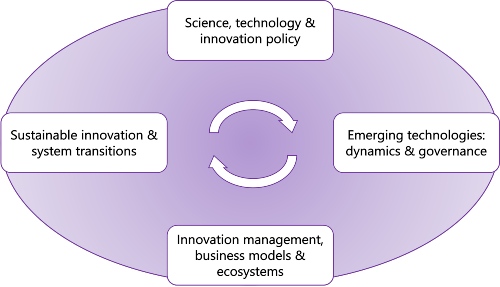Our history and vision
The Manchester Institute of Innovation Research has been a leading centre for the study of science, technology and innovation for over 50 years.

The Manchester Institute of Innovation Research has a rich history spanning more than five decades of pioneering research in science and technology policy and innovation studies.
Our story begins in the late 1960s, with the establishment of an Honours School of Liberal Studies in Science, followed by the formal creation of a Department of Liberal Studies in Science, at the Victoria University of Manchester in 1967.
This department, led by Freddie Jevons, was very much part of a broader movement across the UK and North America to liberalise science education, producing graduates who were not only scientifically literate but also better able to contextualise new scientific and technological discoveries by virtue of parallel studies in the history, philosophy, sociology, politics and economics of science and innovation. The theory was that such graduates would be well-equipped to rise to top leadership positions in industry and policy, improving the quality of industrial management and science and technology policy in the UK.
Meanwhile, over at the newly founded Manchester Business School an R&D Research Unit was established in 1967 by Alan Pearson to investigate how to best determine, control and evaluate corporate R&D expenditure. Pearson was also founding editor of the journal R&D Management, created in 1970, and he helped establish the professional body that became known as the Research and Development Management Association (RADMA).
The Department of Liberal Studies in Science eventually spawned two major research and teaching centres: PREST (Policy Research in Engineering, Science and Technology), established in 1977, and, a little later, a Centre for the History of Science, Technology and Medicine (CHSTM). PREST quickly became a leading voice in science and technology policy research, and in the mid-1990s itself spawned a new centre, the ESRC Centre for Research on Innovation and Competition (CRIC) in collaboration with colleagues at the Manchester School of Management at UMIST.
A major infrastructure grant in 2002 and the merger of the Victoria University of Manchester with UMIST in 2004 created the opportunity to bring together these established research traditions from the Victoria University, UMIST and MBS, under one physical and institutional roof – the Manchester Institute of Innovation Research.
Today, we continue to build on this remarkable legacy. With over 50 academic and research staff, we maintain our position at the forefront of research into innovation studies, technology management, science policy, and socio-technical transitions.
Our work spans from research that advances our understanding of innovation dynamics in knowledge-based economies to applied policy research that informs decision-makers at national and international levels.
